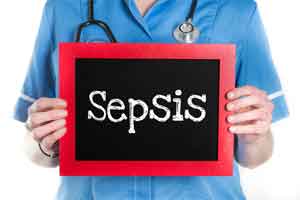- Home
- Editorial
- News
- Practice Guidelines
- Anesthesiology Guidelines
- Cancer Guidelines
- Cardiac Sciences Guidelines
- Critical Care Guidelines
- Dentistry Guidelines
- Dermatology Guidelines
- Diabetes and Endo Guidelines
- Diagnostics Guidelines
- ENT Guidelines
- Featured Practice Guidelines
- Gastroenterology Guidelines
- Geriatrics Guidelines
- Medicine Guidelines
- Nephrology Guidelines
- Neurosciences Guidelines
- Obs and Gynae Guidelines
- Ophthalmology Guidelines
- Orthopaedics Guidelines
- Paediatrics Guidelines
- Psychiatry Guidelines
- Pulmonology Guidelines
- Radiology Guidelines
- Surgery Guidelines
- Urology Guidelines
Septic shock with no diagnosis at 24 hours: Critical care study

The lack of a patent source of infection after 24 hours of management of shock considered septic is a common and disturbing scenario. Damien Contou et al aimed to determine the prevalence and the causes of shock with no diagnosis 24 hours after its onset, and to compare the outcomes of patients with early-confirmed septic shock to those of others.
The researchers conducted a pragmatic, prospective, multicenter observational cohort study in ten units (ICU) in France. All consecutive patients admitted to the ICU with suspected septic shock defined by clinical suspicion of infection leading to antibiotic prescription plus acute circulatory failure requiring vasopressor support were included in the study.
A total of 508 patients were admitted with suspected septic shock. Among them, 374 had early-confirmed septic shock, while the 134 others had no source of infection identified nor microbiological documentation retrieved 24 hours after shock onset. Among these, 37/134 had late-confirmed septic shock diagnosed after 24 hours, 59/134 had a condition mimicking septic (septic shock mimicker, mainly related to adverse drug reactions, acute mesenteric ischemia and malignancies) and 38/134 (28 %) had shock of unknown origin by the end of the ICU stay. There were no differences between patients with early-confirmed septic shock and the remainder in ICU mortality and the median duration of ICU stay, of tracheal intubation and of vasopressor support. The multivariable Cox model showed that the risk of day-60 mortality did not differ between patients with or without early-confirmed septic shock. A sensitivity analysis was performed in the subgroup of patients meeting the Sepsis-3 definition criteria and displayed consistent results.
The researchers concluded that one quarter of the patients admitted in the ICU with suspected septic shock had no infection identified 24 hours after its onset and almost half of them were eventually diagnosed with a septic shock mimicker. Outcome did not differ between patients with early-confirmed septic shock and other patients.
You can read the entire article by clicking on the following link:
The researchers conducted a pragmatic, prospective, multicenter observational cohort study in ten units (ICU) in France. All consecutive patients admitted to the ICU with suspected septic shock defined by clinical suspicion of infection leading to antibiotic prescription plus acute circulatory failure requiring vasopressor support were included in the study.
A total of 508 patients were admitted with suspected septic shock. Among them, 374 had early-confirmed septic shock, while the 134 others had no source of infection identified nor microbiological documentation retrieved 24 hours after shock onset. Among these, 37/134 had late-confirmed septic shock diagnosed after 24 hours, 59/134 had a condition mimicking septic (septic shock mimicker, mainly related to adverse drug reactions, acute mesenteric ischemia and malignancies) and 38/134 (28 %) had shock of unknown origin by the end of the ICU stay. There were no differences between patients with early-confirmed septic shock and the remainder in ICU mortality and the median duration of ICU stay, of tracheal intubation and of vasopressor support. The multivariable Cox model showed that the risk of day-60 mortality did not differ between patients with or without early-confirmed septic shock. A sensitivity analysis was performed in the subgroup of patients meeting the Sepsis-3 definition criteria and displayed consistent results.
The researchers concluded that one quarter of the patients admitted in the ICU with suspected septic shock had no infection identified 24 hours after its onset and almost half of them were eventually diagnosed with a septic shock mimicker. Outcome did not differ between patients with early-confirmed septic shock and other patients.
You can read the entire article by clicking on the following link:
Septic shock with no diagnosis at 24 hours: a pragmatic multicenter prospective cohort study
Next Story
NO DATA FOUND

Disclaimer: This site is primarily intended for healthcare professionals. Any content/information on this website does not replace the advice of medical and/or health professionals and should not be construed as medical/diagnostic advice/endorsement or prescription. Use of this site is subject to our terms of use, privacy policy, advertisement policy. © 2020 Minerva Medical Treatment Pvt Ltd